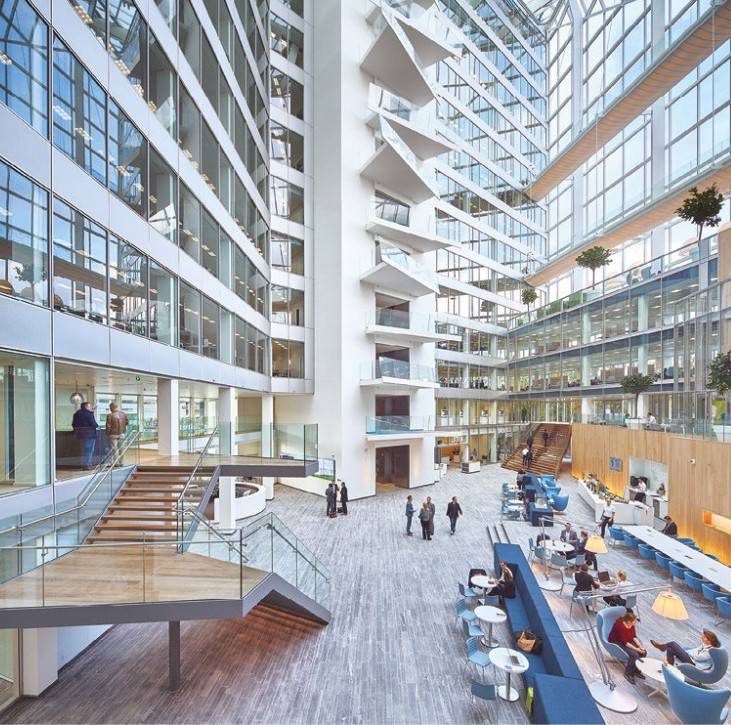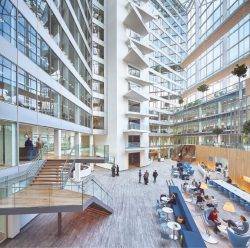February 28, 2018
Workplace health and wellbeing initiatives do not go far enough say staff
 Employers’ efforts in the US to improve staff health and wellbeing are falling short of employees’ expectations, claims a new report. Nearly two-thirds of employees (65 percent) in a report from Willis Towers Watson agree that managing their health is a top priority, but while the majority of employers (56 percent) believe their wellbeing programmes have encouraged employees to live a healthier lifestyle, only 32 percent of employees agree. Eighty-seven percent of employers who participated in the 22nd annual Best Practices in Health Care Employer Survey say increasing employee engagement in health and well-being is a top priority and the research warns that employees in poor health are twice as likely to be disengaged at work and take almost three times as many days off as employees who are in very good health. Employers can improve health behaviour through designing the workplace environment to make it easier for employees to stay fit, eat well, breathe fresh air and address stress adds the report.
Employers’ efforts in the US to improve staff health and wellbeing are falling short of employees’ expectations, claims a new report. Nearly two-thirds of employees (65 percent) in a report from Willis Towers Watson agree that managing their health is a top priority, but while the majority of employers (56 percent) believe their wellbeing programmes have encouraged employees to live a healthier lifestyle, only 32 percent of employees agree. Eighty-seven percent of employers who participated in the 22nd annual Best Practices in Health Care Employer Survey say increasing employee engagement in health and well-being is a top priority and the research warns that employees in poor health are twice as likely to be disengaged at work and take almost three times as many days off as employees who are in very good health. Employers can improve health behaviour through designing the workplace environment to make it easier for employees to stay fit, eat well, breathe fresh air and address stress adds the report.









 City centre take up reached 1,005,000 sq ft in Birmingham last year, 51 percent above the 10-year average of 666,000 sq ft which marked a record year, according to Savills Research. Growth was driven in part by the Government Property Unit (GPU) deal, as public services accounted for 27 percent of take-up in the city centre last year, including the 237,000 sq ft pre-let at Arena Central. Birmingham’s boom was also boasted by take-up from serviced office providers that reached 208,000 sq ft during 2017, the highest level on record and this accounted for 21 percent of the total take-up, more than any other regional city. There now remains a shortage of Prime Grade A space in Birmingham city centre following a number of large lettings. Prime Grade A space now stands at only 169,000 sq ft, enough for only six months of take-up at average levels. Major construction project, Three Snowhill won’t complete until the second quarter of next year, when it will deliver 420,000 sq ft of much needed Grade A office space on its completion. Until then, competition among occupiers will further intensify for Grade A space.
City centre take up reached 1,005,000 sq ft in Birmingham last year, 51 percent above the 10-year average of 666,000 sq ft which marked a record year, according to Savills Research. Growth was driven in part by the Government Property Unit (GPU) deal, as public services accounted for 27 percent of take-up in the city centre last year, including the 237,000 sq ft pre-let at Arena Central. Birmingham’s boom was also boasted by take-up from serviced office providers that reached 208,000 sq ft during 2017, the highest level on record and this accounted for 21 percent of the total take-up, more than any other regional city. There now remains a shortage of Prime Grade A space in Birmingham city centre following a number of large lettings. Prime Grade A space now stands at only 169,000 sq ft, enough for only six months of take-up at average levels. Major construction project, Three Snowhill won’t complete until the second quarter of next year, when it will deliver 420,000 sq ft of much needed Grade A office space on its completion. Until then, competition among occupiers will further intensify for Grade A space.


 Corporate real estate departments need to become more effective partners in the agile transformation of their broader organizations., claims a new survey conducted by CBRE, in partnership with CoreNet Global. When describing Portfolio Agility, i.e. the ability to rapidly adapt, scale and reposition the organization’s real estate portfolio to support shifting enterprise needs, 67 percent consider portfolio agility as the most important type of agility for business success, yet only 14 percent consider themselves highly agile in this area. The most prevalent portfolio agility practices included negotiating flexible space options in the lease, seeking shorter and/or more flexible lease terms, supporting an enterprise-wide flex-work program and delivering free address work environments. The report states that new workplace guidelines for efficiency have altered the way companies plan for density and more occupiers are incorporating third-party ‘agile space’ into their overall real estate strategy.
Corporate real estate departments need to become more effective partners in the agile transformation of their broader organizations., claims a new survey conducted by CBRE, in partnership with CoreNet Global. When describing Portfolio Agility, i.e. the ability to rapidly adapt, scale and reposition the organization’s real estate portfolio to support shifting enterprise needs, 67 percent consider portfolio agility as the most important type of agility for business success, yet only 14 percent consider themselves highly agile in this area. The most prevalent portfolio agility practices included negotiating flexible space options in the lease, seeking shorter and/or more flexible lease terms, supporting an enterprise-wide flex-work program and delivering free address work environments. The report states that new workplace guidelines for efficiency have altered the way companies plan for density and more occupiers are incorporating third-party ‘agile space’ into their overall real estate strategy.
 In a workplace dominated by insecurity, gig work and intelligent machines we need to improve our understanding of their potential impact on health, safety and wellbeing claims a new report.
In a workplace dominated by insecurity, gig work and intelligent machines we need to improve our understanding of their potential impact on health, safety and wellbeing claims a new report. 




 Concern amongst small and medium sized enterprises (SMEs) regarding the current economic climate fuelled by worries over a Brexit-related skills shortages, is at a three-year high, according to the latest Zurich SME Risk Index. It now sits at 56.38, indicating almost a 2 percent rise in perceived risk since Q1 2016 (55.43), and more than 3 percent higher than in October 2016 (54.55). SMEs attitudes towards economic growth, presently sits at a four-year low – with just two in five (40 percent) businesses confident that the UK economic situation will improve over the next 12 months. Similarly, the results regarding SMEs attitudes towards the international trade environment, reveals concern regarding overseas competition and currency rate fluctuations being at its highest in four years at 45.49. Equally, workforce challenges, namely the availability of skills and talent, is also an increasing concern for smaller businesses. Two in five (40 percent) SMEs now see workforce challenges as a major concern for their business; a rise of 8 per cent since October 2016, indicating that political issues are a major influence on the current attitudes of business owners in the UK.
Concern amongst small and medium sized enterprises (SMEs) regarding the current economic climate fuelled by worries over a Brexit-related skills shortages, is at a three-year high, according to the latest Zurich SME Risk Index. It now sits at 56.38, indicating almost a 2 percent rise in perceived risk since Q1 2016 (55.43), and more than 3 percent higher than in October 2016 (54.55). SMEs attitudes towards economic growth, presently sits at a four-year low – with just two in five (40 percent) businesses confident that the UK economic situation will improve over the next 12 months. Similarly, the results regarding SMEs attitudes towards the international trade environment, reveals concern regarding overseas competition and currency rate fluctuations being at its highest in four years at 45.49. Equally, workforce challenges, namely the availability of skills and talent, is also an increasing concern for smaller businesses. Two in five (40 percent) SMEs now see workforce challenges as a major concern for their business; a rise of 8 per cent since October 2016, indicating that political issues are a major influence on the current attitudes of business owners in the UK.
 Over half of UK workers (53 percent) say that the standard of technology is a key consideration for accepting a new job role and more than 1 in 3 (37 percent) would decline a job based on poor hardware alone, claims a new survey. The survey of over 2,000 British adults carried out by gadgets and technology e-tailer, LaptopsDirect.co.uk found that having the latest technology was valued more than other office perks, such as flexible working (45 percent), the working environment/decor (39 percent) and staff discounts (33 percent). Nearly a quarter of respondents (74 percent) overall, believe technology makes them more productive at work, with workers in marketing valuing technology the highest, with 84 percent of the votes, followed by those in creative and photographic (81 percent), information and communications (78 percent), professional services (73 percent) and education (71 percent).
Over half of UK workers (53 percent) say that the standard of technology is a key consideration for accepting a new job role and more than 1 in 3 (37 percent) would decline a job based on poor hardware alone, claims a new survey. The survey of over 2,000 British adults carried out by gadgets and technology e-tailer, LaptopsDirect.co.uk found that having the latest technology was valued more than other office perks, such as flexible working (45 percent), the working environment/decor (39 percent) and staff discounts (33 percent). Nearly a quarter of respondents (74 percent) overall, believe technology makes them more productive at work, with workers in marketing valuing technology the highest, with 84 percent of the votes, followed by those in creative and photographic (81 percent), information and communications (78 percent), professional services (73 percent) and education (71 percent).


 The creative team behind the development of the world’s most sustainable building – The Edge in Amsterdam – has announced the launch of a real estate technology company. EDGE Technologies, launched by OVG Real Estate CEO Coen van Oostrom will focus on creating a new generation of buildings which feature the latest innovations in sustainability and wellbeing. Whereas parent company OVG is focussed exclusively on the development of its existing portfolio, EDGE Technologies will focus on both the development and the long-term operations of this new generation of buildings, aiming for a cohesive experience across cities. Each EDGE building will be built and operated on the same technology platform and offer consistent user-centred design, created to serve the needs of today’s fast-changing and demanding workforce. To help achieve this the new company is launching a product that will capture and aggregate data across its properties in order to optimize, measure and inform both the user experience and the building’s environmental performance.
The creative team behind the development of the world’s most sustainable building – The Edge in Amsterdam – has announced the launch of a real estate technology company. EDGE Technologies, launched by OVG Real Estate CEO Coen van Oostrom will focus on creating a new generation of buildings which feature the latest innovations in sustainability and wellbeing. Whereas parent company OVG is focussed exclusively on the development of its existing portfolio, EDGE Technologies will focus on both the development and the long-term operations of this new generation of buildings, aiming for a cohesive experience across cities. Each EDGE building will be built and operated on the same technology platform and offer consistent user-centred design, created to serve the needs of today’s fast-changing and demanding workforce. To help achieve this the new company is launching a product that will capture and aggregate data across its properties in order to optimize, measure and inform both the user experience and the building’s environmental performance. 








February 28, 2018
The very idea of good work in a gig economy remains a distant ideal
by Tonia Novitz, Alan Bogg et al • Comment, Flexible working
(more…)